语法讲解(used to的用法)同步练习
usedto语法练习题
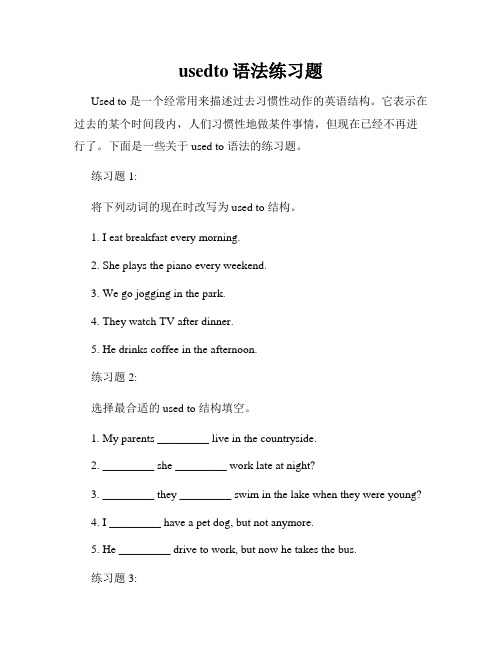
usedto语法练习题Used to 是一个经常用来描述过去习惯性动作的英语结构。
它表示在过去的某个时间段内,人们习惯性地做某件事情,但现在已经不再进行了。
下面是一些关于 used to 语法的练习题。
练习题 1:将下列动词的现在时改写为 used to 结构。
1. I eat breakfast every morning.2. She plays the piano every weekend.3. We go jogging in the park.4. They watch TV after dinner.5. He drinks coffee in the afternoon.练习题 2:选择最合适的 used to 结构填空。
1. My parents _________ live in the countryside.2. _________ she _________ work late at night?3. _________ they _________ swim in the lake when they were young?4. I _________ have a pet dog, but not anymore.5. He _________ drive to work, but now he takes the bus.练习题 3:根据提供的句子,写出相应的 used to 结构。
1. I used to play soccer when I was a child.2. She used to _______________ her bike to school.3. They used to _______________ movies every weekend.4. We used to _______________ friends in the park.5. He used to _______________ his grandparents during the summer vacation.练习题 4:改写句子,使用 used to 结构。
人教九年级上英语作业课Unit4第三课(GrammarFocus4c)—单元同步语法精讲精练
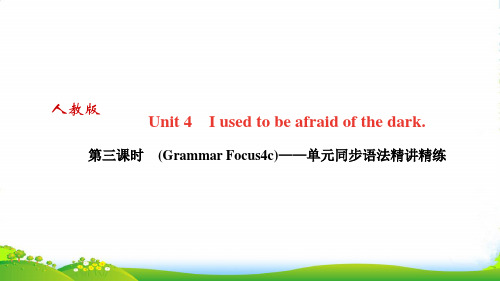
一、根据句意,用括号中所给单词的适当形式填空。 1.My uncle has been to someE_u_r_o_p_e_a_n_ (Europe) countries before. 2.We can see a lot of __A_f_r_ic_a_n_ (Africa) elephants in this picture. 3.Jim Green was born in France,but his parents are ________ British (Britain).
一、单项选择。
(D )1.How Zhang Min has changed!
She does so well in grammar now,but she ________ hate to learn it.
A.agreed to
B.decided to
C.wanted to D.used to
The students didn't use to play soccer,did they?学生们过去不踢足球,不是 吗?
►拓展相关知识 ①be used to (doing) sth.“习惯于(做)某事”,在此结构中,to为介词,后接 名词或动词ing形式。 eg:Are you used to the life in the North China?你习惯中国北方的生活吗? I am used to getting up early.我习惯早起。 ②be used to do sth.“被用来做某事”,属于被动语态形式。 eg:A bookshelf is used to store books.书架被用来储藏书。
人教版
Unit 4 I used to be afraid of the dark.
九年级英语U-4语法-used to 的用法+练习
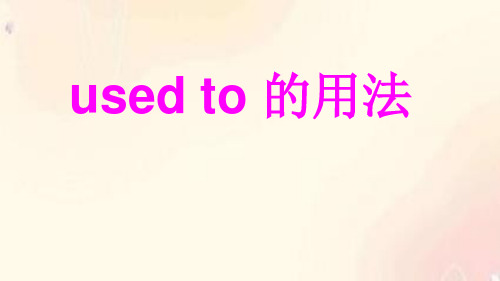
综合练习---单选
Did you use to play the piano? 你以前经常弹钢琴吗?
= Used you to play the piano?
Yes, I did.
No, I didn’t.
2. 含有used to 的反义疑问句
陈述部分
used to didn’t use to
附加部分
didn’t + 主语 did+ 主语
1.She used to ___ to school late, but now she doesn’t. A.go B.went C.goes
2.He ___ like English, but now he likes it very much. A.didn’t used to B.didn’t use to C.doesn’t use to
相似 结构
be used to do sth. 被用于做某事
是use… to do sth. 的被动语态结构
be used for doing sth. 被用于做某事 = be used to do sth.
3. 与used to 相似的结构
翻译练习:
1. 我的妈妈习惯早起。 My mother is used to getting up early.
used to 的用法
U.S. → 联合国 us → 我们
2024人教版九年级英语上册期中used to 的用法专题复习练习题(答案解析)
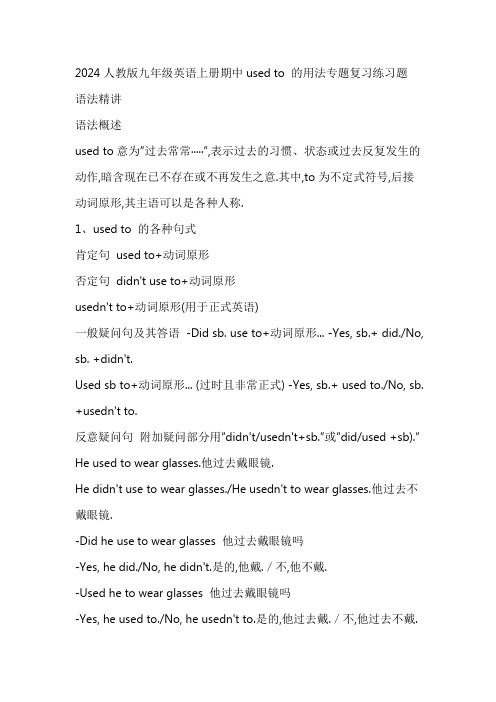
2024人教版九年级英语上册期中used to 的用法专题复习练习题语法精讲语法概述used to意为”过去常常·····”,表示过去的习惯、状态或过去反复发生的动作,暗含现在已不存在或不再发生之意.其中,to为不定式符号,后接动词原形,其主语可以是各种人称.1、used to 的各种句式肯定句used to+动词原形否定句didn't use to+动词原形usedn't to+动词原形(用于正式英语)一般疑问句及其答语-Did sb. use to+动词原形... -Yes, sb.+ did./No, sb. +didn't.Used sb to+动词原形... (过时且非常正式) -Yes, sb.+ used to./No, sb. +usedn't to.反意疑问句附加疑问部分用”didn't/usedn't+sb.”或”did/used +sb).”He used to wear glasses.他过去戴眼镜.He didn't use to wear glasses./He usedn't to wear glasses.他过去不戴眼镜.-Did he use to wear glasses 他过去戴眼镜吗-Yes, he did./No, he didn't.是的,他戴./不,他不戴.-Used he to wear glasses 他过去戴眼镜吗-Yes, he used to./No, he usedn't to.是的,他过去戴./不,他过去不戴.He used to wear glasses, didn't he 他过去戴眼镜,不是吗He usedn't to wear glasses, used he 他过去不戴眼镜,是吗2、used to的there be结构used to 用于there be结构中时,形式为there used to be,表示”过去曾有”.There used to be a private school here.这儿曾经有一所私立学校.3、used to的相似结构辨析used to do sth. 过去常常做某事只用于过去时be/get used to doing sth. 习惯于做某事用于现在、过去或将来时等多种时态be used to do sth. 被用于做某事用于多种时态People should get used to travelling by public transportation.人们应该习惯于乘坐公共交通工具出行.Stamps can be used to send letters.邮票可以用来寄信.基础训练一、单项选择1.— Are you a teacher—No, I’m not, but I was. I ________ teach English in a middle school. A.used to B.was used to C.di dn’t use to D.did use to 2.—Jane got high marks in the Chinese exam.—________ big progress she has made! She ________ weak in English. A.What a; used to be B.What; used to beC.How; used to be D.How a; was used to being3.I ________ late. But now I ________ up early.A.used to get up; am used to getting B.used to sleeping; am used to getC.am used to sleeping; used to get D.used to get up; am used for getting4.The China you see today is quite a different country from the one it ________.A.used to being B.is used to be C.used to be D.is used to being 5.—________ she use to have short hair—Yes. But her hair is long now.A.Does B.Was C.Did D.Is6.—________ he use to live in a city—Yes, but after moving here, he ________ the life in a village. A.Did, used to B.Was, is getting used to C.Did, is used to 7.He used to ________ books to relax himself, but now he has been used to ________ mountains.A.read; climb B.reading; climb C.read; climbing D.reading; climbing8.Amy ________ be a shy girl and hardly talked with others.A.is used to B.used to C.was used to D.use to9.— She hardly used to ride her bike to school, did she—________. She always took the bus.A.Yes, she did B.Yes, she didn’tC.No, she did D.No, she didn’t10.There ________ thick forests here, but now it’s a new school. A.used to have B.were used to having C.used to be二、完成句子11.Joseph used to go swimming in summer. (对划线部分提问) What Joseph use to in summer12.There used to be lots of rain in this season. (改为一般疑问句) there to be lots of rain in this season13.Paula used to be popular in school.(改为否定句)Paula to be popular in school.14.Linda hardly used to go to the library. (改为反意疑问句) Linda hardly used to go to the library,15.—Did Sally use to eat junk food (作否定回答)— , she .提升训练一、单项选择1.Jae used to __________ in the small village. Now he get used to __________ in the big city.A.live; living B.living; living C.live; live D.living; live 2.Tina isn’t as shy as she ________. She ________ to sing in front ofcrowds.A.is, dares B.used, dare C.are used to be, dare D.used to be, dares3.—How does Jack usually go to school—He ________ a bus, but now he ________ there to keep healthy. A.used to take; is used to walkingB.is used to take; used to walkC.is used to taking; used to walk4.This robot ________ cut paper.A.is used for B.used to be C.is used to D.is used as 5.The river in my village is clean now. However, it ________ polluted seriously.A.is used to be B.was used to be C.used to be D.was used to being6.—Lucy, the spoon is used to ________ the soup.—O h, I see. But I’m not used to ________ it.A.have; use B.having; using C.having; use D.have; using 7.The hole (坑) ________ a swimming pool but now it ________ fish. A.is used to be; is used to keep B.used to be; is used to keep C.used to be; is used to keeping D.is used to be; is used to keep a lot8.There________a cinema in the center of our town, but now amiddle school stands there.A.is used to be B.is used to being C.used to be D.used to being 9.There ________ a lot of trees here, but now it has become desert. A.is B.are C.used to be D.used to being10.Jack _______ dislike the weather in Beijing in spring, but now he _______ it.A.is used to, used to B.used to, used toC.was used to, gets used to D.used to, gets used to二、完成句子11.我的爷爷习惯每天早上浏览报纸。
Unit4Iusedtobeafraidofthedark语法小专题配套练习题
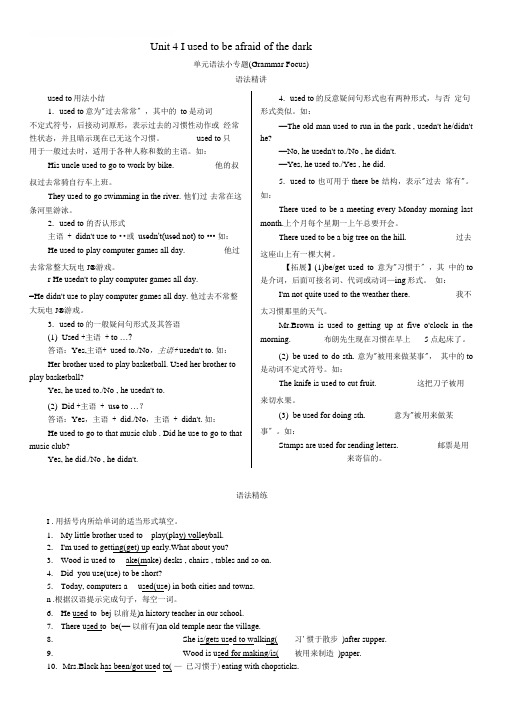
Unit 4 I used to be afraid of the dark单元语法小专题(Grammar Focus)语法精讲used to用法小结ed to意为"过去常常〞,其中的to是动词不定式符号,后接动词原形,表示过去的习惯性动作或经常性状态,并且暗示现在已无这个习惯。
used to只用于一般过去时,适用于各种人称和数的主语。
如:His uncle used to go to work by bike. 他的叔叔过去常骑自行车上班。
They used to go swimming in the river. 他们过去常在这条河里游泳。
ed to 的否认形式主语 + didn't use to ••或usedn't(used not) to ••• 如:He used to play computer games all day. 他过去常常整大玩电J®游戏。
r He usedn't to play computer games all day.=He didn't use to play computer games all day. 他过去不常整大玩电J®游戏。
ed to的一般疑问句形式及其答语(1)Used +主语 +to …?答语:Yes,主语+ used to./No,主语+ usedn't to. 如:Her brother used to play basketball. Used her brother to play basketball?Yes, he used to./No , he usedn't to.(2)Did +主语 + use to …?答语:Yes,主语 + did./No,主语 + didn't. 如:He used to go to that music club . Did he use to go to that music club?Yes, he did./No , he didn't.ed to的反意疑问句形式也有两种形式,与否定句形式类似。
初中英语 人教九年级Unit 4 单元语法 讲解及练习 (含答案)
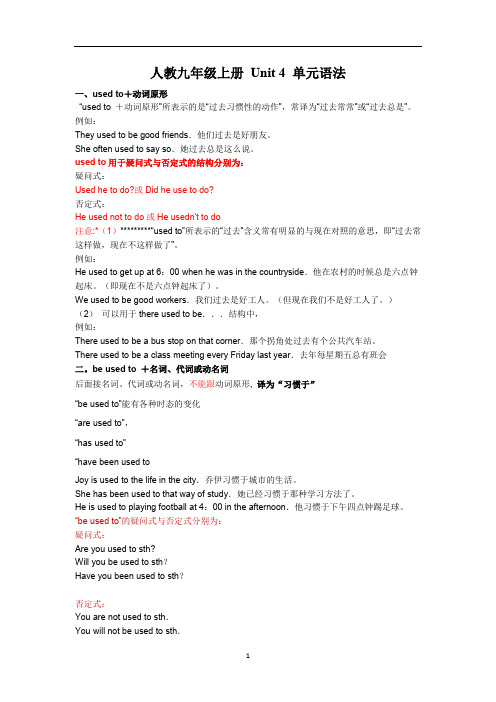
人教九年级上册Unit 4 单元语法一、used to+动词原形“used to +动词原形”所表示的是“过去习惯性的动作”,常译为“过去常常”或“过去总是”。
例如:They used to be good friends.他们过去是好朋友。
She often used to say so.她过去总是这么说。
used to用于疑问式与否定式的结构分别为:疑问式:Used he to do?或Did he use to do?否定式:He used not to do或He usedn't to do注意:*(1)*********“used to”所表示的“过去”含义常有明显的与现在对照的意思,即“过去常这样做,现在不这样做了”。
例如:He used to get up at 6:00 when he was in the countryside.他在农村的时候总是六点钟起床。
(即现在不是六点钟起床了)。
We used to be good workers.我们过去是好工人。
(但现在我们不是好工人了。
)(2)可以用于there used to be...结构中,例如:There used to be a bus stop on that corner.那个拐角处过去有个公共汽车站。
There used to be a class meeting every Friday last year.去年每星期五总有班会二。
be used to +名词、代词或动名词后面接名词、代词或动名词,不能跟动词原形,译为“习惯于”“be used to”能有各种时态的变化“are used to”,“has used to”“have been us ed toJoy is used to the life in the city.乔伊习惯于城市的生活。
She has been used to that way of study.她已经习惯于那种学习方法了。
Unit4语法usedto人教版英语九年级全册

Used to 解析(含练习检测及答案)"used to" 是一个常用的短语,用于表示过去某个时间段内的习惯或经常性的动作或状态。
它通常用来描述过去已经发生但现在不再发生的事情。
用法:1. "used to" 后面接动词的原形。
例如:I used to play the piano when I was younger.(我小时候常常弹钢琴。
)They used to live in London.(他们过去住在伦敦。
)2. "used to" 也可以用于疑问句和否定句中:Did you use to smoke?(你过去抽烟吗?)She didn't use to like spicy food.(她过去不喜欢辣食。
)否定形式:"used to" 的否定形式是"didn't use to"。
表示过去没有某种习惯或经常性的动作或状态:I didn't use to eat vegetables, but now I do.(过去我不吃蔬菜,但现在我吃。
)疑问形式及回答:疑问形式使用助动词"did" 来构成疑问句,回答时根据情况选择肯定或否定回答:Did she use to live here?(她过去住在这里吗?)Yes, she did.(是的,她过去住在这里。
)No, she didn't.(不,她过去没有住在这里。
)注意:"used to" 表示的是过去的习惯或状态,现在已经改变。
如果描述的是现在的习惯或状态,应该使用一般现在时。
【练习】1. 将下列动词短语改写成"used to" 结构的句子:a) I played soccer when I was younger.______________________________________________________________________b) She watched TV every evening.______________________________________________________________________c) They ate pizza on Fridays.______________________________________________________________________d) We went swimming in the summer.______________________________________________________________________2. 将下列句子改写成否定形式:a) She used to go to that school.______________________________________________________________________b) We used to visit our grandparents every weekend.______________________________________________________________________【检测】3. 根据提示,完成下列句子:a) _____________ you _____________ wear glasses when you were younger?b) My dad _____________ to work by bike, but now he drives.4. 将下列句子改写成疑问形式:a) She used to play tennis.______________________________________________________________________b) They used to go camping every summer.______________________________________________________________________【提升】5. 根据所给的提示,完成下列句子:a) ______________ you _____________ afraid of spiders when you were a child?b) My sister _____________ to be a vegetarian, but she started eating meat again.6. 将下列句子改写成否定疑问形式:a) They used to live in that house.______________________________________________________________________b) Did she used to play the piano?______________________________________________________________________7. 将下列句子翻译成英文:a) 你小时候常常去公园吗?______________________________________________________________________b) 他过去住在一个小村庄里。
九年级Unit 4 used to 用法及练习
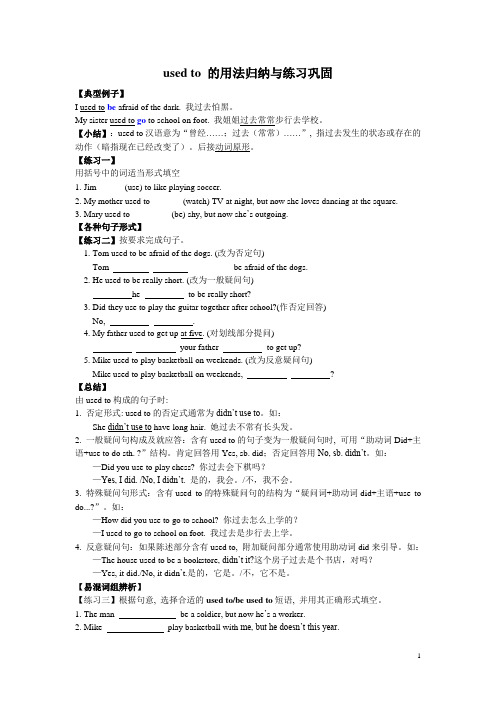
used to 的用法归纳与练习巩固【典型例子】I used to be afraid of the dark. 我过去怕黑。
My sister used to go to school on foot. 我姐姐过去常常步行去学校。
【小结】:used to汉语意为“曾经……;过去(常常)……”, 指过去发生的状态或存在的动作(暗指现在已经改变了)。
后接动词原形。
【练习一】用括号中的词适当形式填空1. Jim ______(use) to like playing soccer.2. My mother used to _______(watch) TV at night, but now she loves dancing at the square.3. Mary used to _________(be) shy, but now she’s outgoing.【各种句子形式】【练习二】按要求完成句子。
1. Tom used to be afraid of the dogs. (改为否定句)Tom _________ be afraid of the dogs.2. He used to be really short. (改为一般疑问句)he to be really short?3. Did they use to play the guitar together after school?(作否定回答)No, .4. My father used to get up at five. (对划线部分提问)your father to get up?5. Mike used to play basketball on weekends. (改为反意疑问句)Mike used to play basketball on weekends, ?【总结】由used to构成的句子时:1. 否定形式: used to的否定式通常为didn’t use to。
- 1、下载文档前请自行甄别文档内容的完整性,平台不提供额外的编辑、内容补充、找答案等附加服务。
- 2、"仅部分预览"的文档,不可在线预览部分如存在完整性等问题,可反馈申请退款(可完整预览的文档不适用该条件!)。
- 3、如文档侵犯您的权益,请联系客服反馈,我们会尽快为您处理(人工客服工作时间:9:00-18:30)。
语法讲解(used to的用法)同步练习
(答题时间:15分钟)
Ⅰ. 单项选择
1. I ________ frustrated when I wasn’t sure of the correct answer.
A. may be
B. used to
C. used to be
D. use to be
2. When I was a child, I used to _________ chocolate.
A. liking
B. like
C. liked
D. likes
3. ___________ work in Microsoft?
A. Did you used to
B. Did you use to
C. Do you used to
D. Do you use to
4. Where ___________ live before you came here?
A. did you used to
B. did you use to
C. use he to
D. he used to
5. My father is used to _______at weekends.
A. fish
B. fishing
C. fishes
D. fished
Ⅱ. 句型转换
1. Ann used to concentrate more on clothes than studies. (改为否定句)
Ann ________ ________ to concentrate more on clothes than studies.
2. I used to have noodles for dinner. (改为一般疑问句并作肯定或否定回答)
—________ you _______ ________have noodles for dinner?
—Yes, I _________.
— No, I _________.
3. The boy liked ice cream in the past. He doesn’t eat it now. (改为同义句)
The boy ______ ______ ______ice cream.
4. Her sister used to be very short. (对划线部分提问)
_________ _______her sister ______ _____ ________ ________?
5. He used to work late at night. (对划线部分提问)
______ ______ he _____ _____ ______ at night?
语法讲解(used to的用法)同步练习参考答案
Ⅰ. 1. C 句意为“以前当我确定不了正确答案时,我常常很沮丧”,故用used to do结构,故选C项。
2. B used to do sth.意为“过去常常做某事”,故选B项。
3. B used to do的一般疑问句借助于助动词did,used改为use,故选B项。
4. B 浏览题干可知句意为“在你来这儿以前,你在哪儿居住?”,故选B项。
5. B be used to doing sth.意为“习惯于做某事”;句意为“我爸爸习惯在周末钓鱼”。
Ⅱ. 1. didn’t use 2. Did; use to; did; didn’t 3. used to like
4. What did; use to look like
5. What did; use to do
古希腊哲学大师亚里士多德说:人有两种,一种即“吃饭是为了活着”,一种是“活着是为了吃饭”.一个人之所以伟大,首先是因为他有超于常人的心。
“志当存高远”,“风物长宜放眼量”,这些古语皆鼓舞人们要树立雄心壮志,要有远大的理想。
有一位心理学家到一个建筑工地,分别问三个正在砌砖的工人:“你在干什么?”
第一个工人懒洋洋地说:“我在砌砖。
” 第二个工人缺乏热情地说:“我在砌一堵墙。
” 第三个工人满怀憧憬地说:“我在建一座高楼!”
听完回答,心理学家判定:第一个人心中只有砖,他一辈子能把砖砌好就不错了;第二个人眼中只有墙,好好干或许能当一位技术员;而第三个人心中已经立起了一座殿堂,因为他心态乐观,胸怀远大的志向!
井底之蛙,只能看到巴掌大的天空;摸到大象腿的盲人,只能认为大象长得像柱子;登上五岳的人,才能感觉“一览众山小”;看到大海的人,就会顿感心胸开阔舒畅;
心中没有希望的人,是世界上最贫穷的人;心中没有梦想的人,是普天下最平庸的人;目光短浅的人,是最没有希望的人。
清代“红顶商人”胡雪岩说:“做生意顶要紧的是眼光,看得到一省,就能做一省的生意;看得到天下,就能做天下的生意;看得到外国,就能做外国的生意。
”可见,一个人的心胸和眼光,决定了他志向的短浅或高远;一个人的希望和梦想,决定了他的人生暗淡或辉煌。
